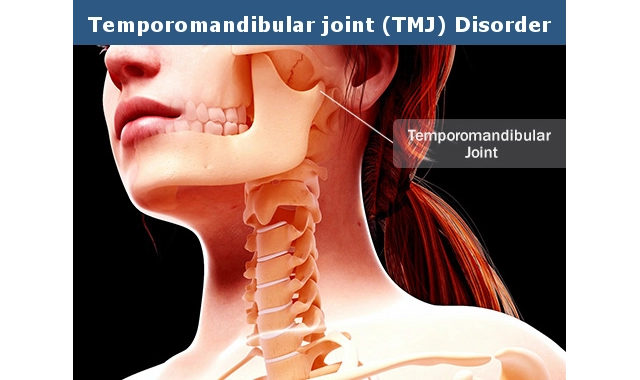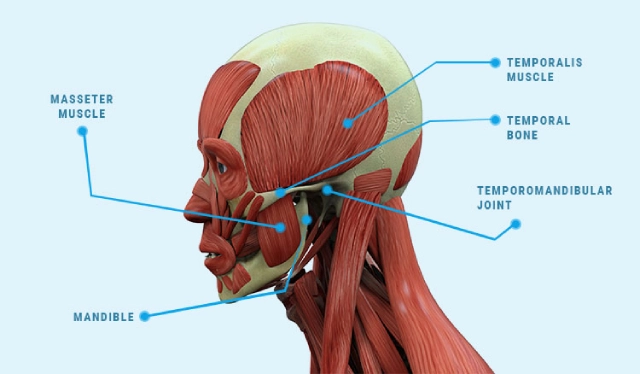Health
How can Temporomandibular Joints (TMJ) Cause Sore Throat

Temporomandibular disorder (TMD) is a problem and disorder associated with the jaws, jaws, joints, and facial muscles. TMJ, is short for temporomandibular joints, is the hinge that connects the Jaw to the skull. They are found on each side of the face; they slide over each other and allow you to move your Jaw for activities like yawning, talking, and chewing. But sometimes, the Jaw does not function the way it should, and this results in TMJ. It is commonly found in adults within the age of 20-40 years and is more likely to occur in women than men. TMJ allows movement from side to side, up and down, back and front. Attached to it is a cartilage that absorbs shock and prevents the bone from wear and tear
Causes of TMJ
TMJ’s known cause has not been established, but it has been attributed to some underlying problems. The problem may be from the muscles or the joint. All other future symptoms take their causes from this. It also commonly arises from the dislocation of the joints, and several activities can lead to this. They include:
- Injury or dislocation of the Jaw
- Clenching and grinding of the teeth.
- This activity exerts pressure on the joint and may lead to dislocation.
- Arthritis may lead to damage to the cartilage in the joint
- Teeth and jaws are not aligned right.
- Stress can cause tightening of the facial muscles.
A popular myth suggests that braces may lead to a TMJ problem, but it has not been proven.
Symptoms of TMJ

The most common symptom of TMJ and TMD is Jaw pain, which is relatable. TMJ has to deal with the jaw joints on both sides of the face. The pain experienced is usually dull and aching with the jaw muscles feeling tender. Aside from this, other symptoms may be experienced by patients suffering from TMJ. They include:
- Headaches
- Tender muscles
- Stiff Jaw that causes the Jaw to feel out of place
- The upper and lower teeth do not fit together
- Ear pain
- Painful clicking of the Jaw especially when opening and closing the mouth
- Discomfort when chewing
- Radiating pain from the Jaw to the neck
Other symptoms that may be experienced include dizziness, tinnitus, and vision problems, although this is not a common TMJ symptom. The symptoms vary with people, and while some experience multiple symptoms, others have no sign of pain associated with TMJ. Experiencing jaw pain does not necessarily mean that you have a TMJ disorder. Jaw pain not associated with TMJ will disappear on its own, but if you are experiencing jaw pains with other TMJ symptoms. It is advisable to see a doctor. Explain all TMJ symptoms to your physician.
Diagnosis of TMJ
TMJ is very difficult to diagnose; your physician will spend a lot of time trying to rule out TMJ. There are no particular tests or definitive exams for TMJ. It is challenging to diagnose and harder to treat. TMJ has many symptoms ranging from tender muscles, stiff Jaw, tinnitus, neck pain, and gum disease. All these symptoms may indicate another condition. The vagueness in all the symptoms is a contributing factor to the difficulty experienced in diagnosing TMJ. It may probably take 2-3 visits to your physician before he can be sure you have TMJ. Any physician can treat you for TMJ, but the best option is a dentist specializing in TMJ.
Risk factors associated with TMJ
The following factors raise the chances of developing TMJ; the presence or absence of this risk factor does not mean you have TMJ. If you have many of the risk factors involved with TMJ, see your physician on what to do next.
- Age: the people between the age of 20 and 40 have a higher chance of developing TMJ
- Gender: women are at a high risk of developing TMJ than men
- Health Problem: Arthritis, Jaw or facial injuries
- Stress-related Habits: some habits increase the risk of developing TMJ, such as clenching and unclenching the Jaw, and grinding of teeth.
You can reduce the risk of developing TMJ by emulating other ways of coping with stress. Avoid clenching and unclenching of the Jaw during stress and avoid jaw injury that may raise TMJ’s risk. Practice safe habits like wearing a helmet during bicycle riding or wearing a seatbelt.

Treatment, Medication, and surgery for TMJ
There is different treatment for TMJ, but doctors are not sure of which treatment is more effective. Before getting any treatment on TMJ, it is better to get a second opinion. Over the years, some treatment is not effective, and sometimes they become harmful to the patients. Surgery is recommended when non-surgical procedures are ineffective but should be the last resort. This usually occurs when the case is severe, and the patients have no control over the symptoms. Surgery is a controversial treatment for TMJ because the effect is irreversible. There are medications for TMJ, but they come with side effects like drowsiness or weight gain. Acetaminophen is mostly prescribed for TMJ; it helps reduces the pain but does not treat the inflammation.
TMJ NO More Program
This is an electronic book that helps you treat TMJ and other related disorders. It provides a natural and safe way of treating this disorder, but you will need to adjust your lifestyle. For a significant result, a level of discipline and commitment is required. The book is divided into two segments. The first segment provides information about TMJ, the causes, risk factors, diagnosis, and symptoms. While the second segment discusses possible treatments and ways of healing TMJ. It gives a 3-steps approach of curing TMJ
- Mouth exercise and movement
- Diet and supplement to be taken
- Food to avoid that will increase the risk of TMJ.
Pros of the Book
- Procedures are easy to carry out
- It provides ways of tackling TMJ
- It helps avoid Medication and its side effects
- There is no side effect
- Ingredients in the food can be gotten locally
Cons
- It comes only in an electronic format
- It requires a change in lifestyle.
-

 Business2 weeks ago
Business2 weeks agoNayef Doleh Examines International Humanitarian Fundraising Strategies
-

 Business3 weeks ago
Business3 weeks agoHow Black Banx is Redefining Global Banking Strategies in 2025
-

 Business2 weeks ago
Business2 weeks agoHow to fill MSME Form 1? Step-by-Step Guide
-

 Tech4 weeks ago
Tech4 weeks agoHow to Switch Between Microsoft Teams and Skype, How To Export Messages, Files, and Contacts from Skype Before It Shutting Down
-

 Tech3 weeks ago
Tech3 weeks agoMicrosoft Teams to End SMS Messaging Feature Support for Android Phones and Switch to Phone Link App as Alternative
-

 Education3 weeks ago
Education3 weeks agoSchool Of Odd Thinkers – Think Odd, Learn a lot, and Earn a lot
-

 Education3 weeks ago
Education3 weeks agoThe Power of Differentiated Instruction: Patrick Granfar Discusses Its Impact on Student Learning
-
Business2 weeks ago
From Marine to Chief: The Leadership Journey of Sean Mannix













